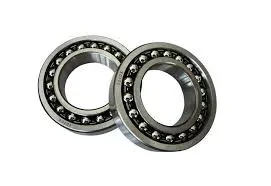
Dec . 07, 2024 11:45 Back to list
full complement cylindrical roller bearings
Full Complement Cylindrical Roller Bearings An In-depth Analysis
Full complement cylindrical roller bearings are a specialized type of bearing designed for applications requiring high load capacities and robust performance. Unlike standard cylindrical roller bearings that utilize a cage to separate the rollers, full complement designs use a maximum number of rollers that fit within the given space, allowing for greater contact area and load distribution. This unique configuration provides several advantages and accommodating features that make full complement cylindrical roller bearings a popular choice in various industrial applications.
Design and Construction
The fundamental design of full complement cylindrical roller bearings consists of two concentric rings, an inner and an outer ring, with a series of cylindrical rollers positioned between them. The absence of a cage allows for a higher number of rollers, which significantly increases the load-carrying capacity. This design is ideal for applications where loads are heavy and space is limited, as it optimizes the use of the available bearing space.
Full complement cylindrical roller bearings are typically constructed from high-quality materials such as hardened steel, stainless steel, or ceramic, depending on the specific application requirements. The rollers themselves are often designed with a slight curvature at each end, which helps to reduce edge stresses and improve load distribution.
Advantages
1. Increased Load Capacity One of the primary advantages of full complement cylindrical roller bearings is their ability to handle large axial and radial loads. The increased number of rollers distributes the load across a greater surface area, which reduces wear and extends the life of the bearing.
2. Space Efficiency These bearings are designed to fit within limited axial dimensions, making them particularly effective in applications with space constraints. By maximizing the number of rollers, manufacturers can provide high-performance solutions without the need for larger bearing sizes.
full complement cylindrical roller bearings

3. Reduced Friction The design of full complement cylindrical roller bearings often leads to lower friction levels compared to traditional bearings. This reduction in friction can translate to less heat generation, improved efficiency, and lower energy consumption in machinery.
4. Versatility Full complement cylindrical roller bearings are highly adaptable and can be used in a wide array of applications, from heavy industrial machinery to automotive components. Their robustness makes them suitable for environments where shock loads and vibrations are prevalent.
Disadvantages
While full complement cylindrical roller bearings offer numerous advantages, there are some considerations to keep in mind. Their design can lead to limitations in speed; because these bearings lack a cage, they may not perform as well under very high rotational speeds compared to their caged counterparts. Moreover, the absence of a cage can make installation and handling more challenging, as care must be taken to avoid damaging the rollers during assembly.
Applications
Full complement cylindrical roller bearings are employed in diverse applications where their high load capacity and durability are essential. Industries such as construction, mining, and manufacturing commonly utilize these bearings in heavy machinery, gearboxes, and conveyor systems. They are also found in railway rolling stock, wind turbines, and various types of automotive applications, including axle and transmission systems.
Conclusion
Full complement cylindrical roller bearings represent a critical component in many heavy-duty applications where high loads and reliability are paramount. Their unique design, capable of accommodating large numbers of rollers, translates into enhanced load capacity and reduced friction, making them invaluable in demanding environments. While they come with certain limitations regarding speed and installation complexity, their benefits far outweigh these concerns in the appropriate applications. Understanding the intricacies of full complement cylindrical roller bearings, including their construction, advantages, and suitable applications, can help engineers and designers make informed decisions to optimize performance in their machinery and equipment. As industries continue to evolve, the role of these specialized bearings will undoubtedly remain significant in ensuring the efficiency and longevity of mechanical systems.
Latest news
-
Grooved Ball Bearing Design and Functionality
NewsJun.04,2025
-
Concrete Mixer Bearing Load Capacity Testing
NewsJun.04,2025
-
6004 Bearing Dimensions in Robotic Joint Designs
NewsJun.04,2025
-
Advantages of Single-Row Deep Groove Ball Bearings
NewsJun.04,2025
-
Applications of Deep Groove Ball Bearings in Automotive Systems
NewsJun.04,2025
-
Innovations in Bearing Pressing Machine Design
NewsJun.04,2025
